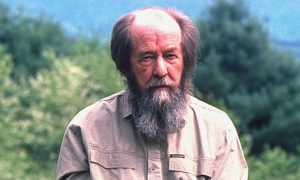The Little Mermaid is one of Hans Christian Andersen’s most beloved fairy tales. There is a depth of pathos and sacrifice that makes it a compelling and enduring story. And there are some obvious themes that emerge: the power of love to transform; the individual’s will as a weapon against restrictive social norms; the disappointment that follows unmet needs and fantasies.
Yet, there is an even deeper theme that knits these sub-themes together for the reader: the role of suffering in growing a fully human soul capable of wisdom and self-reflection.

Recall that one of the conditions the protagonist faces in order to have an opportunity to marry the object of her dreams is pain, the corporal presence of suffering. The witch that provides the potion to the youngest sea princess warns her in advance:
You will feel great pain, as if a sword were passing through you. But all who see you will say that you are the prettiest little human being they ever saw. You will still have the same floating gracefulness of movement, and no dancer will ever tread so lightly. Every step you take, however, will be as if you were treading upon sharp knives and as if the blood must flow. If you will bear all this, I will help you.
In its current milieu, at least in highly-developed countries, society is enveloped in a cocoon of transhumanism. We have a plethora of devices that create a shared illusion of security, comfort, and to a degree, a sense of happiness and achievement, fleeting though they be. Ultimately, technology, like almost everything else, becomes nothing more than a distraction.
As culture author Erica Etelson puts it: “Members of modern societies think themselves very clever though we lack even rudimentary knowledge of the biological and artificial life systems that support us. Lacking much authentic wisdom and knowledge, we tend to take vicarious pride in the inventions of others – I, who cannot so much as spark a flame without a match, feel intelligent by dint of my fellow human’s invention of the combustion engine.”
Etelson is getting at something profound here. True wisdom is never gained simply by living life, especially a life spent in the the womb of technological comfort, a carefully manicured landscape of hand-crafted coffee concoctions, well-parsed tweets, and meticulously detailed career paths, all or which so cleverly and subtly reduce our essence in ways that seem manageable, so that on a spiritual level, we “become comfortably numb.” For there is a price to pay for this comfortable numbness because in eschewing suffering, we suffer even more, ironically.
The Russian novelist, philosopher, historian, and short story writer, Aleksandr Isayevich Solzhenitsyn wrote profoundly about suffering in The Gulag Archipelago, a three-volume nonfiction text that explores the horrors of the Soviet forced labour camp system from 1918-1965. Solzhenitsyn believed the road to salvation and wisdom was fraught with suffering and that this suffering made a person fully human and whole, in touch with his or her inner spiritual essence.
In The Gulag Archipelago, Solzhenitsyn writes with an acute sense of awareness about this fundamental aspect of the human condition: “For you still have to verify whether that’s how it is going to be. And you also have to work out—what is gladness and what is grief. And now the rule of your life is this: Do not rejoice when you have found, do not weep when you have lost. Your soul, which formerly was dry, now ripens with suffering.”

The little mermaid withstands this suffering in selfless sacrifice for love, for she not only agrees to unrelenting physical pain, but gives away her most powerful device to woo the prince, her voice: “‘But I must be paid, also,’ said the witch, ‘and it is not a trifle that I ask. You have the sweetest voice of any who dwell here in the depths of the sea, and you believe that you will be able to charm the prince with it. But this voice you must give to me. The best thing you possess will I have as the price of my costly draft, which must be mixed with my own blood so that it may be as sharp as a two-edged sword.’”
In this sense, the sea princess gives up her most valuable possession, one that she feels she desperately needs, in order to pursue her true love.
Yet, in agreeing to the witch’s terms, the little mermaid also consents to give up her natural longevity, trading a life of three hundred years for a chance to find true love. In doing so, she accepts the inevitable consequence: suffering, released only by death through an act of sacrifice.
Much like Christ’s passion on the cross, the sea princess is ultimately redeemed by her sacrifice for the prince, who she is, ironically, never allowed to be with. In doing so, she receives the most powerful gift of all from the “daughters of the air”: spiritual immortality.
Taking pity on her after she expires from the physical realm, the daughters say, “‘You, poor little mermaid, have tried with your whole heart to do as we are doing. You have suffered and endured, and raised yourself to the spirit world by your good deeds, and now, by striving for three hundred years in the same way, you may obtain an immortal soul.’”
In the end analysis, neither Anderson nor Solzhenitsyn were advocating for people to intentionally seek suffering as a means to personal growth. Rather, they explore the notion that the condition of being fully human is predicated on the acceptance of suffering as a means to an end: wisdom and the growing of a soul that inexorably connects us to our brothers and sisters across the globe, all who endure suffering in their own manner.
Joseph Pearce, Senior Contributor at The Imaginative Conservative and Director of the Center for Faith and Culture at Aquinas College in Nashville, Tennessee, captures this zeitgeist eloquently:
Most of us do not need years in prison to come to our senses, as Solzhenitsyn did, though one wonders how much it might do us good. But we do need suffering. We do need sorrows. We do need our crosses to bear. It is, however, not suffering that sets us free from ourselves and our comfortable numbness but the acceptance of suffering. This is the beginning of wisdom.
If suffering is not accepted it embitters. It twists us. It shrivels us. In contrast, the acceptance of such sorrow and suffering is liberating. It sets us free. It allows us to grow into the fully human persons we are meant to be. This is why Solzhenitsyn could bless the prison in which he found himself. He did so because prison had set him free.
And if we care to dig a little deeper into the recesses of the darkness of humanity, Solzhenitsyn gives us a prophetic sense of what can happen when we are unwilling to suffer for greater things, such as freedom:
Human nature is full of riddles; . . . one of those riddles is: how is it that people who have been crushed by the sheer weight of slavery and cast to the bottom of the pit can nevertheless find strength in themselves to rise up and free themselves first in spirit and then in body while those who soar unhampered over the peaks of freedom suddenly lose the taste of freedom, lose the will to defend it, and, hopelessly confused and lost, almost begin to crave slavery?
This philosophical stance that life is a riddle, that it has no meaning except that which we make through our conscious efforts to grow a soul by accepting suffering and the concomitant enlightenment of gratitude that accompanies it, is unsettling, to say the least. Of course, that is intentional on Solzhenitsyn’s part.
After all, life is an endless riddle, one that is ephemeral and temporal, one which promises us that we will inevitably shuffle off our “mortal coil” only after enduring the “The slings and arrows of outrageous fortune.”
However, Solzhenitsyn should not be misunderstood as a pessimist. Daniel J. Mahoney, Augustine Chair in Distinguished Scholarship at Assumption College and Solzhenitsyn scholar puts it this way: “He insists light is ontologically prior to darkness, despite the persistence of evil in the human soul.” In this light, life itself imitates the ethos of fairy tales. We struggle, we stumble, we fail, but we inevitably overcome through our transformation to being fully human, and through the final transcendence provided by our eternal souls. Anderson himself would agree, stating, “Life itself is the most wonderful fairy tale.”
At Newsweed.com, we adhere to three simple principles: truth, balance, and relatability. Our articles, podcasts, and videos strive to present content in an accurate, fair, yet compelling and timely manner.
We avoid pushing personal or ideological agendas because our only agenda is creating quality content for our audience, whom we are here to serve. That is why our motto is ”Rolling with the times, straining for the truth.”
Your opinion matters. Please share your thoughts in our survey so that Newsweed can better serve you.
Charles Bukowski, the Los Angeles beat poet that captured the depravity of American urban life once said, “There is something about writing poetry that brings a man close to the cliff’s edge.” Newsweed is proud to stand in solidarity and offer you a chance to get close to the cliff’s edge with our first Power of Poetry Contest.
Are you a budding bard, a versatile versifier, a rhyming regaler? Do you march to the beat of iambic pentameter, or flow like a river with free verse? If so, here’s your opportunity to put your mad poetic chops to the test. Enter our poetry contest for bragging rights and an opportunity to win some cash!






